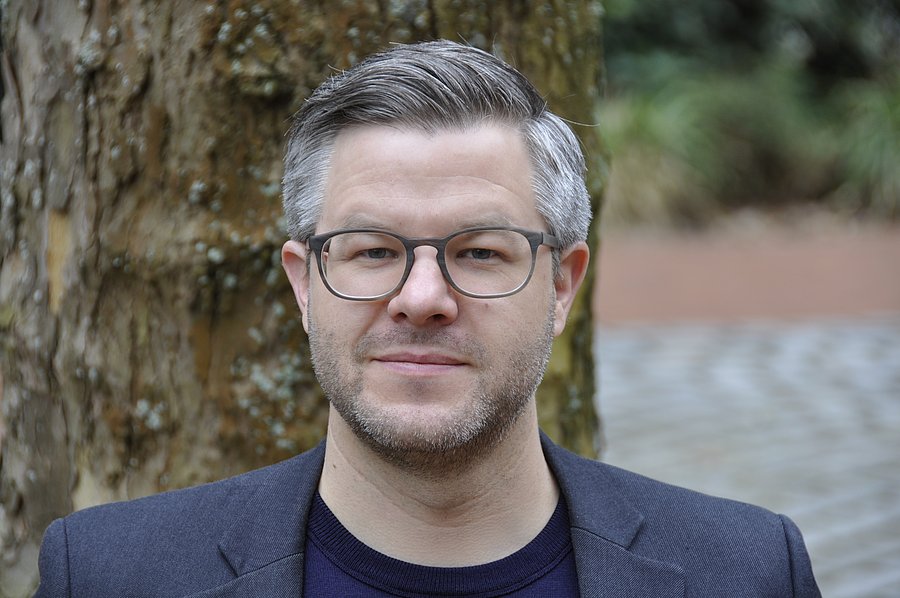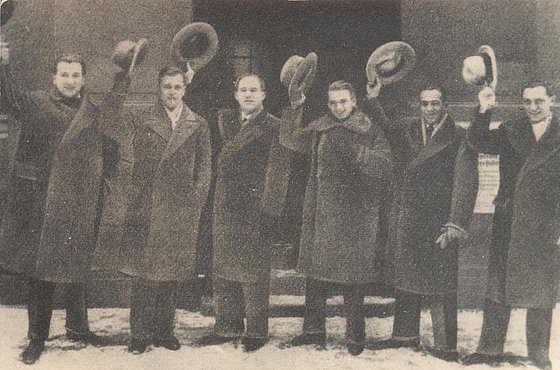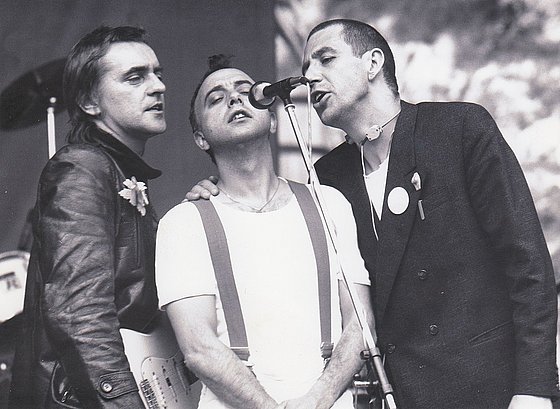
Schlager - an elixir of resilience
Dr Antonius Weixler / Modern German Literary Studies
Photo: UniService Third Mission
German hit songs - an elixir of resilience
Antonius Weixler on the transgenerational connection of German pop songs
What do the songs Der lachende Vagabund (The laughing vagabond) by Fred Bertelsmann, Junge, komm bald wieder (Come back soon, boy) by Freddie Quinn and Butterfly by Daniel Gerard have in common? They are the most commercially successful German pop songs of the 20th century, with over two million records sold. Dr Antonius Weixler, a German scholar at the University of Wuppertal, took a closer look at the German hit songs, of which there are also some examples from Wuppertal.
Mädchen aus Wuppertal
“There was a pop singer from Wuppertal who gave himself the congenial stage name Ted Power,” the academic says. ”With the song Mädchen aus Wuppertal (Girl from Wuppertal), he produced a very special pop gem.” Weixler also mentions the music project Honk and their hit Hallo Helmut (Hello Helmut). ”The German chorus Senegal, illegal, scheißegal (Senegal, illegal, shitty) rhymes with Wuppertal.” The band's follow-up hit is then called Wochenende, saufen, geil (Weekend, booze, cool), which perhaps sums up the German hit songs formula quite succinctly, he explains. German hit songs are always a bit about celebrating alcohol consumption to a problematic extent and celebrating hedonistic dissolution of boundaries. Only a short time ago, the renowned writer Heinz Strunk wrote the screenplay for the series Last Exit Schinkenstraße and also played the leading role in it. And with this series about the lager loud tourist, it is hard to say whether it is a declaration of love to the Mallorca hit or more of a satire. ”The truth is probably a bit in between. That's why there are two sides of German hit songs, and why I also have a little weakness for the more bizarre varieties.”

Germany's first boy band? Comedian Harmonists 1928
Photo: public domain
The German hit songs comes from the operetta
”In terms of history, the expression comes from the 19th century,” reports Weixler, ”German hit songs were mentioned for the first time in Vienna in 1886, and at that time it was mainly used to refer to particularly successful pieces of music that were taken from operettas and became hits.” The term Gassenhauer (popular song) originated at around the same time, when Johann Strauss Father and Johann Strauss Son were real purveyors of Gassenhauer and operettas. Our understanding of the term today, however, is more likely to have adopted the word in the 1920s. During this time, the Comedian Harmonists, an international Berlin vocal ensemble, were very successful and could perhaps be described as the first boy group from today's perspective. However, German hit songs are not a purely German phenomenon. ”I would rather look at transcultural and intercultural developments,” the academic says, because when you look at this and all other genres, you can recognise throughout the history of art and literature and in both high culture and pop culture that aesthetic forms have always influenced each other across national borders. ”Culture is not something that takes place within national borders, so I would say that German hit songs is less of a German phenomenon and perhaps more of a German variety of pop.”
German hit songs and propaganda
German hit songs were often misused during the National Socialist era, e.g., Davon geht die Welt nicht unter (It’s not the end of the world) is a song of perseverance that was interpreted as a resistance song after the war. And Heintje's song Mama from the 1960s is actually a pop song composed in 1938 and was used in a film that was steeped in National Socialist blood-and-soil ideology. Weixler explains why the pop song worked so well for propaganda purposes: ”The pop song is a phenomenon of popular culture that appeals to many and also appeals to many because it is based on simple forms with simple and catchy messages. This means that there are structural similarities between pop song lyrics and political slogans. They both deliver messages that somehow want to address you directly and, above all, want to trigger an emotional effect. This mixture is immediately memorable. That's why such popular forms must almost naturally attract the interest of propaganda, because propaganda isn't based on facts either and wants to appeal to people emotionally above all.”
The hit song during the economic miracle
After Second World War, the Italo hits caused a sensation, reflecting a television craze that already existed - with one crucial difference - in the 1920s. ”The hits of the Weimar Republic were actually the first peak phase and were strongly characterised by exoticism, i.e., a longing for faraway places, although at the time this was a feeling of longing for people who were unable to travel themselves. Back then, it was still an imagined and not a seen distance.” That changed after the Second World War. With the economic miracle and the emergence of mass tourism in the 1950s, the distance then became a distance that was actually seen. ”During this time, Italy was the main destination for Germans and the Italo hit was so successful during this period because it brought something of this attitude to life back to Germany. When Germans travelled to Italy, they not only got to know the sun and sea, but also a new attitude to life, namely a feeling of lightness and ease, the dolce far niente (the sweetness of doing nothing, editor's note), which is very different from German narrow-mindedness, the German ideal of diligence and German philistinism.” And this is still repeated today, because what was the Italo hit of the 1950s, is today the Malle hit.

The most successful entertainment singer from 1956 - 1966: Freddy Quinn (1977),
Photo: CC BY-SA 3.0 nl
International performers sing in German
In the meantime, many international artists such as the American Connie Francis, the Belgian musician Salvatore Adamo, the Swede Siw Malmkvist, the French Mireille Mathieu and the Greek artists Vicky Leandros and Nana Mouskouri have also sung German hits. Weixler comments: “Vicky Leandros’ song Ich liebe das Leben (I love the life) from 1975 is currently enjoying a small revival. She was recently honoured once again by Nina Chuba, the most important pop artist of our time in Germany, with a beautiful cover version. Internationality, or the longing for faraway places, is generally a highly popular phenomenon in pop culture and therefore also in pop songs.” Even in the post-war period, international stars recorded completely different language versions of songs in order to serve several markets. The German music market has always been one of the largest and most lucrative in Europe. "The Beatles recorded a song in German with Komm gib mir deine Hand (Come, give me your hand), Elvis sang Wooden Heart, a song originally called Muss i denn zum Städtele hinaus (Do I have to leave the town), which was quite common back then.” With a critical eye, Weixler explains that although internationality was already perceived positively, it always had to be a German-language internationality in the post-war period. ”In terms of criticism of colonialism and perhaps also collective psychology, you could say that after the defeat in the Second World War, this Germanised internationalism in the post-war period expressed something like a residual nationalist-colonialist idea of superiority.”

Musical minimalism: The band Trio 1982 Photo: CC BY-SA 3.0
Death and resurrection
From the 1960s and 1970s, best known for the hit parade with Dieter Thomas Heck, many people still remember regular guests such as Michael Holm, Toni Marschall, Katja Ebstein and Marianne Rosenberg. In the 1980s, German hit songs was considered dead. ”I would say that Neue Deutsche Welle (New German Wave) was the interim death of German hit songs,” explains the academic, ”because in the late 1970s and early 1980s, a German-language subversive pop genre emerged for the first time. At least in the early days, New German Wave was a counterculture that combined international trends such as new wave, punk, industrial and electronic music with German lyrics. A mainstream overproduction then emerged relatively quickly, and that was also the end of the New German Wave era.” For the first time, German lyrics that weren't bland and didn't use insinuating punk humour, i.e., German lyrics that weren't embarrassing but actually seemed cool, were combined with fresh, mostly electronic music. ”In this New German Wave era, German hit songs became the music of the elderly, and such an image has always been the death knell for any pop music genre."
When Guildo Horn appeared, things got a bit more bizarre again and in the 2000s, the next generation came along with Helene Fischer, Andrea Berg, and Florian Silbereisen, inspiring many people again. ” German hit songs achieve this because they are well-known, catchy and convey emotion,” Weixler emphasises, ”they also give a strong contemporary feel.” What other pop genres fail to achieve is a transgenerational connection. ” German hit songs are the only genre that manages to bring generations together in celebration. That is the great integrative power of German hit songs.” It is easy to combine German hit songs with very old folk songs, because if you look at the history of literature, there are always advocates of these simple forms of popular music. ”As early as the 1770s, Johann Gottfried Herder wrote about these folk songs that they were not written for paper and quiet reading, but for communal singing. He also describes that the ideal pitch of such folk songs is, in his formulation, a simple 'child's tone'. As this 'children's tone' is simple and can be understood immediately, almost regardless of the level of education or previous knowledge, this ad hoc comprehensibility means that these texts can be sung along to immediately. As a result, the lyrics convey an affective-sensual component and then provide revitalisation, sensuality and joie de vivre. And that in turn connects the generations.”
An elixir of resilience
” German hit songs are resilience in a major key”, the journalist Franz Kasperi says . That sounds a lot like Adorno, smiles Weixler, who is known to have been the classic critic of popular forms and of German hit songs in particular. "He summarised his criticism in this brilliantly succinct formula: 'Fun is a steel bath'. By this, Adorno meant that the escapism, the flight from reality, which is inherent in such popular forms, only serves to ensure that the recipients remain accessible to the rational logic of capitalism, i.e., that they are and remain employable for hard, energy-sapping labour." If you watch documentaries about German hit songs fans, you often hear phrases like "The working week was hard... and now we want to have a bit of fun and an ideal world at the weekend." The pop song then becomes an elixir of resilience. The music sociologist Hans Egon Holthusen wrote: "All of this can perhaps be experienced more intensely in the utterly mortal music of the season than in the great music of the geniuses." For Weixler, German hit songs definitely has the potential to seduce in the moment. "It creates a presence, but always in the mode of longing."
The Bill Ramsey classic Zuckerpuppe from the 1961 belly dance group, which reached number five in the hit parade and stayed in the charts for a full five months, should of course not go unmentioned in this context. At the end, it ends with the beautiful line: "... Because I knew the sugar doll from the belly dance troupe from Wuppertal, from Wuppertal".
Uwe Blass
Dr Antonius Weixler works as a lecturer with a specified function in Modern German Literature at the University of Wuppertal.
